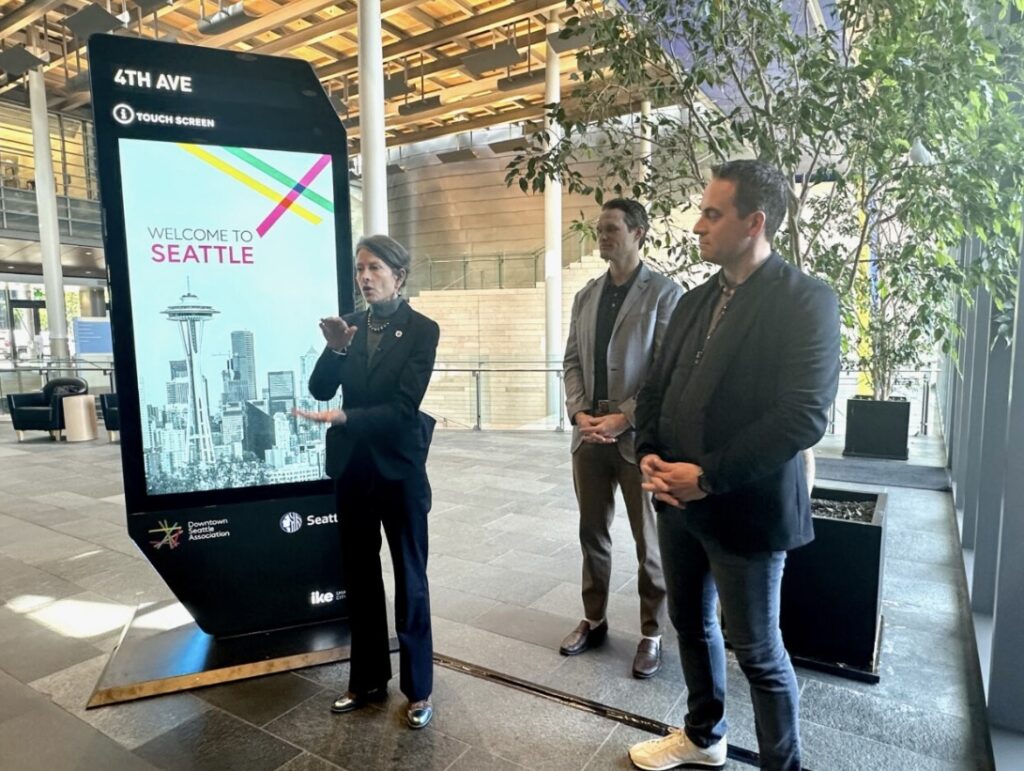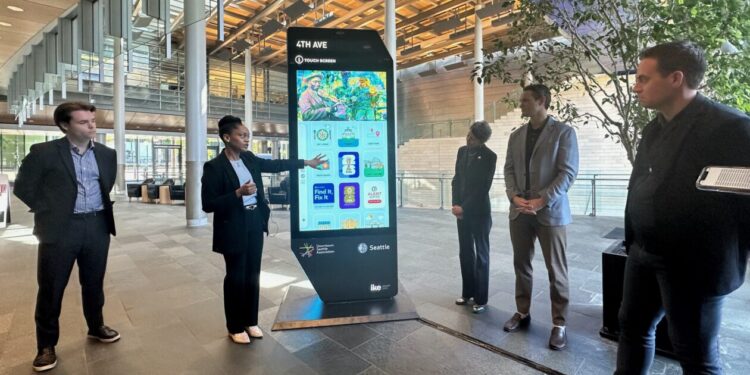A plan to bring digital wayfinding kiosks to downtown Seattle is moving forward, following a key vote by the Seattle City Council that could reshape how residents and tourists interact with the city’s public spaces.
In a 7-2 decision on Tuesday, the Council approved a resolution granting conceptual approval for digital kiosks that would be installed throughout Seattle’s downtown core and other high-traffic neighborhoods. Councilmembers Alexis Mercedes Rinck and Cathy Moore opposed the measure.
The initiative, part of Mayor Bruce Harrell’s Downtown Activation Plan, is aimed at revitalizing Seattle’s urban core post-pandemic. The kiosks would offer a range of services including free public Wi-Fi, real-time transit updates, directions, city event listings, health and safety alerts, and more—all funded by advertising.
What to Know About the Proposed Seattle Digital Kiosks
The kiosks—called IKE (Interactive Kiosk Experience) Smart City—are developed by Columbus, Ohio-based Orange Barrel Media. In partnership with the Downtown Seattle Association (DSA), the proposal seeks to bring 30 kiosks to the Metropolitan Improvement District by 2026, just in time for the FIFA World Cup.
A second phase would install 30 more kiosks downtown and another 20 across Business Improvement Areas (BIAs), including SoDo, Ballard, University District, and West Seattle.
Each kiosk is more than eight feet tall and three feet wide, with a touchscreen that allows users to interact with apps like “Find It, Fix It,” search for nearby businesses, or even make emergency 911 calls via a built-in button.
No Cost to City, Revenue-Generating Potential
One of the most attractive features of the proposal is its no-cost implementation for the City of Seattle. The kiosks are expected to generate up to $1.1 million annually in advertising revenue, which would be directed to the DSA. Any revenue exceeding a predetermined threshold would be shared with the City.
Council President Sara Nelson, a vocal supporter, emphasized the kiosks’ potential to fund:
- 10 additional downtown ambassadors for cleaning, hospitality, and safety
- 15 outdoor concerts and 15 art installations
- 5 electric cleaning trikes
- Beautification of 2 public plazas
- 1 electric vacuum to maintain sidewalks and protected bike lanes
“This is a win for public space activation and financial sustainability,” said Nelson.

Community Support and Concerns
DSA President and CEO Jon Scholes spoke during the Council meeting’s public comment period, calling the kiosks “a smart public-private partnership” that can support downtown workers and events.
“Every day, our team helps people navigate downtown. These kiosks will amplify that work and drive engagement with events and local businesses,” Scholes said.
However, the plan is not without critics. Some residents and city officials have raised concerns about visual clutter, light pollution, and the oversaturation of advertising in public spaces.
Amendments and Privacy Protections
Two amendments proposed by Councilmember Dan Strauss failed to pass. The first would have prohibited any camera technology on the kiosks due to surveillance concerns. Though the kiosks include a selfie camera for a “Photo Booth” app, the company assures users that no images are stored or transmitted, and there are no video surveillance capabilities.
Seattle’s IT department has reviewed the IKE Smart City technology and confirmed it complies with the City’s surveillance ordinance.
The second amendment would have capped the kiosk program at 17 years, citing the risk of technological obsolescence. That measure was also voted down.
A third amendment, introduced by Councilmember Joy Hollingsworth, was approved in an 8-1 vote. It encourages the DSA and the City to ensure revenue from the kiosks supports equity across Seattle, including neighborhoods outside the core business districts.
What’s Next?
The next stage involves drafting a detailed permitting ordinance, which will go before the Council’s Economic Development Committee on June 12. A full Council vote may follow on June 24.
If fully approved, Seattle would join a growing list of U.S. cities—currently 23—that have adopted smart city kiosks to enhance public access to information, promote local events, and support tourism and business.







